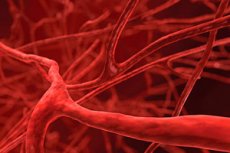Study links protein secreted by blood vessels to drug-resistant cancer
最近審查:14.06.2024

Cancer is one of the leading causes of death worldwide. One of the main reasons cancer is such a deadly disease is the ability of cancer cells to become resistant to drugs.
After decades of medical research, scientists have come to understand that cancerous tumors often contain a special population of cells called cancer stem cells (CSCs). Like normal stem cells, CSCs can self-renew and differentiate into various cell types within a tumor, playing important roles not only in tumor growth and metastasis, but also in the development of drug resistance.
Unfortunately, developing therapies that specifically target CSCs has proven quite challenging given their ability to adapt and repopulate. Therefore, some researchers turned their attention to the blood vessels inside tumor tissue.
Over the past few years, scientists have discovered that certain subpopulations of endothelial cells (the cells that line blood vessels) secrete angiocrine factors that regulate the proliferation and maturation of stem cells. Understanding which cells produce these factors and what their functions are in the tumor microenvironment could, in turn, lead to the development of new cancer therapies.
Against this backdrop, a research team from Japan, including Professor Hiroyasu Kidoi and Dr. Yumiko Hayashi from the Department of Integrative Vascular Biology, Faculty of Medical Sciences, Fukui University, conducted a study on secreted frizzled-related protein 1 (Sfrp1), an angiocrine factor, to clarify its role in tumor tissues.
Their results were published online in the journal In Vitro Cellular & Developmental Biology.
“Although blood vessels are usually viewed only as routes for the supply of oxygen and nutrients, our research focuses on a completely different function of blood vessels, namely the production of angiocrine factors. We conducted this study with the idea that angiocrine factors may also be involved in tumor progression and sought to find out whether Sfrp1 influences the maintenance of CSCs and tumor tissue in general,” explains Professor Kidoya.
To clarify these questions, the researchers created Sfrp1 gene knockout (Sfrp1-KO) mice using CRISPR-Cas9 gene editing. They then transplanted lung carcinoma tumors into Sfrp1-KO and wild-type mice and observed the effects of Sfrp1 (or lack thereof) using standard techniques such as immunohistochemical staining, flow cytometry, and quantitative genetic expression analysis.
Initial experiments showed that Sfrp1 is produced by a small subset of vascular endothelial cells in tumor tissue and that its presence is important for tumor growth. Tumor growth was suppressed in Sfrp1-KO mice, and transplanted tumor cells overexpressing Sfrp1 resulted in faster tumor growth.
Interestingly, the researchers found that tumors lacking Sfrp1 were unable to support significant populations of CSCs late in tumor growth, despite these tumors having a higher initial percentage of CSCs. This discovery is especially important as it indicates one of the biological roles of Sfrp1 in the tumor microenvironment and its participation in cancer pathology.
“Some CSCs in tumor tissues are in a state of arrested cell proliferation, and their presence promotes tumor growth and resistance to anticancer drugs,” explains Professor Kidoya. "Our results indicate that Sfrp1 may regulate CSC self-replication and transient malignant growth, as well as maintain a quiescent state."
Further results showed that Sfrp1 did not affect the structure of blood vessels within the tumor, suggesting that the observed effects on tumor growth were not related to the vasculature. Instead, genetic expression analysis revealed that Sfrp1 promotes CSC maintenance by modulating the well-conserved Wnt signaling pathway (an evolutionarily conserved pathway that regulates important aspects of cell fate determination, cell migration, and organogenesis in embryonic development).
Overall, the new knowledge provided by this study may pave the way for the development of new cancer therapies that target mechanisms that help maintain CSCs.
“Targeting specialized vascular endothelial cells involved in the production of angiocrine factors may help disrupt the CSC niche, serving as a potential approach to inhibit tumor growth with minimal side effects,” concludes Professor Kidoya.
“I believe this could lead to the development of treatments for patients with intractable cancer whose tumors are resistant to cancer drugs, as well as therapeutics to suppress cancer recurrence and metastasis.”
Further research based on these findings will serve as a stepping stone to effective treatments for drug-resistant cancer.

